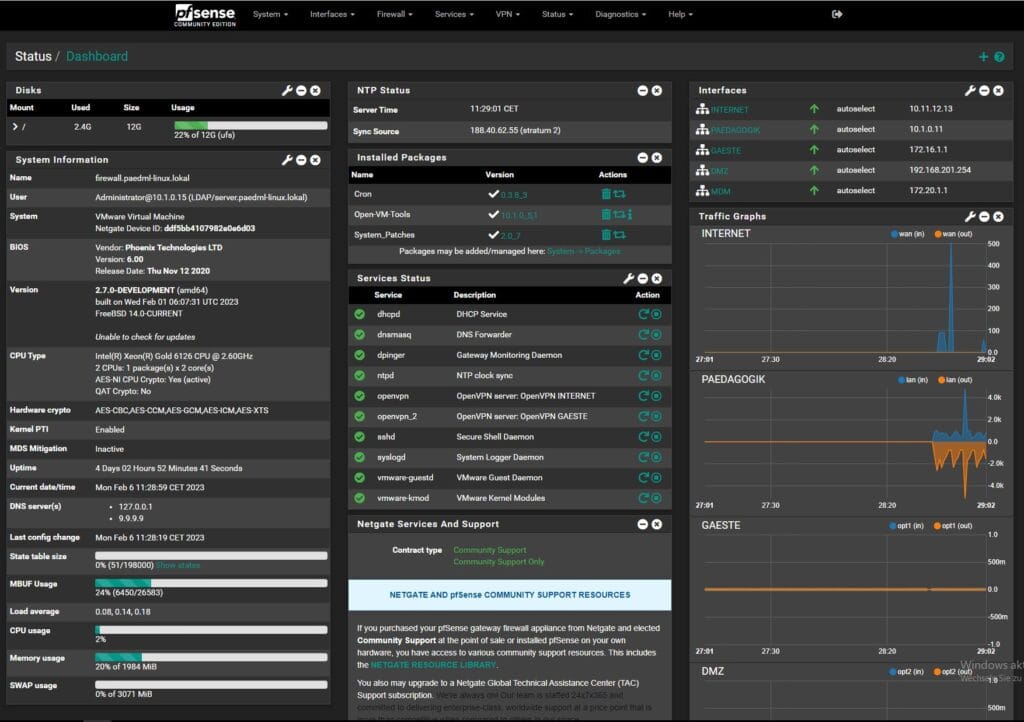pfSense is a highly versatile open-source firewall and router software distribution based on FreeBSD, typically installed on a physical computer or a virtual machine to make a dedicated firewall or router for a network.
It provides a comprehensive web-based UI that allows users to configure and manage its features without needing to be familiar with command-line tools, which, combined with its powerful capabilities, has made it the preferred choice for countless network security professionals and enthusiasts worldwide.
However, the pfSense Home+Lab version released in February 2022 for free will no longer be available. But before we continue with the reasons for this decision, let’s give our readers a little background.
pfSense Software

Netgate, the company developing the pfSense firewall, offered two varieties of its software:
- pfSense Community Edition (CE): This is the free version of the pfSense software that’s open-source. Suitable for personal use, hobbyists, and many business scenarios.
- pfSense Plus: A commercial version that builds upon the CE with more features, optimized performance, and premium support. It is intended for business use, especially in complex environments.
Then, in February 2022, Netgate released a third version for free under the name pfSense Home+Lab.
It builds on the CE version, complementing it with some of the features available in the paid Plus to attract customers to the paid offering. An approach widely used in many open-source projects.
Unfortunately, a year and a half after that, in an unexpected move and without prior notice, Netgate made a sharp turn.
No More Freely Available pfSense Home+Lab
On October 26, Netgate announced that the free download of pfSense Home+Lab will no longer be available. The main reasons given are:
The decision to stop offering the Home+Lab version of pfSense Plus was made in order to align Netgate’s business model to better serve our worldwide customer base and partners while continuing to invest in the development and support of the product.
However, the more important factor that prevailed in this decision lies in the following part of the announcement:
Further, unauthorized redistribution of pfSense Plus Home+Lab software is a growing challenge. Multiple appliance vendors are downloading the pfSense Plus Home+Lab commercial version of the software and installing it on their own appliances, which they then sell on multiple online marketplaces and their own websites.
In other words, the use of pfSense Home+Lab by many vendors downloading the software and integrating it into their hardware devices, then selling it, did not sit well with Netgate – the result – the decision to stop offering the pfSense Home+Lab.
As expected, the current users of the freely distributed CE version will not be affected by these events. They will continue to use it at no cost. Not so, however, for users who decided to bet over the past year and a half on pfSense Home+Lab.
They will not be able to get timely updates with bug fixes, and improved features may be limited and would require a paid subscription. Put another way, in practice, they either have to switch to a paid option or migrate to another solution for their network security needs.
Bottom Line
We won’t dwell on whether Netgate’s decision to discontinue providing pfSense Home+Lab was the right or wrong move. After all, they own the software and have every right to dispose of it according to their views and corporate interests.
The more critical question that once again comes out on top, however, is how trustworthy it is for users to put their trust in a company-backed product, accepting that at any moment, they could find themselves facing severe challenges.
Or do community-driven projects continue to be the most dependable choices? Questions to which each of you must find the correct answer for yourself.
While for the home user, replacing pfSense Home+Lab with an alternative solution, such as OPNsense, may result in a few invested hours of additional labor, this is not the case if you are a business integrating the product into your IT infrastructure.
Then, switching to another solution would inevitably have financial implications, which is not the thing you were counting on when you put your trust in it.
Anyway, the life of pfSense Home+Lab was bright but short, giving plenty of food for thought. In the meantime, pfSense CE continues to be a reliable solution for your network security, but always keep one thing in mind.

They got rid of the free home lab addition. You can now run PF since plus on your own hardware for 129 a year. Considering everything you get which is unlimited devices of the limit of the hardware and you get PF since plus 429 a year. It’s a great deal. Of course we can’t have nice things because there were people that were taking the free home lab and using it to resell devices with the free home lab and charging a premium because it’s PF since Plus.
but always keep one thing in mind? Hu? What to keep in mind?